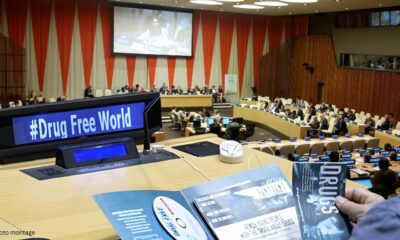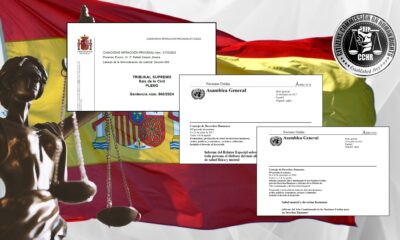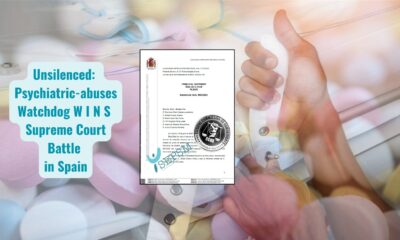Health & Society
Chasing Perfection: David Popovici’s Golden Triumph in the 200m Freestyle at Paris 2024
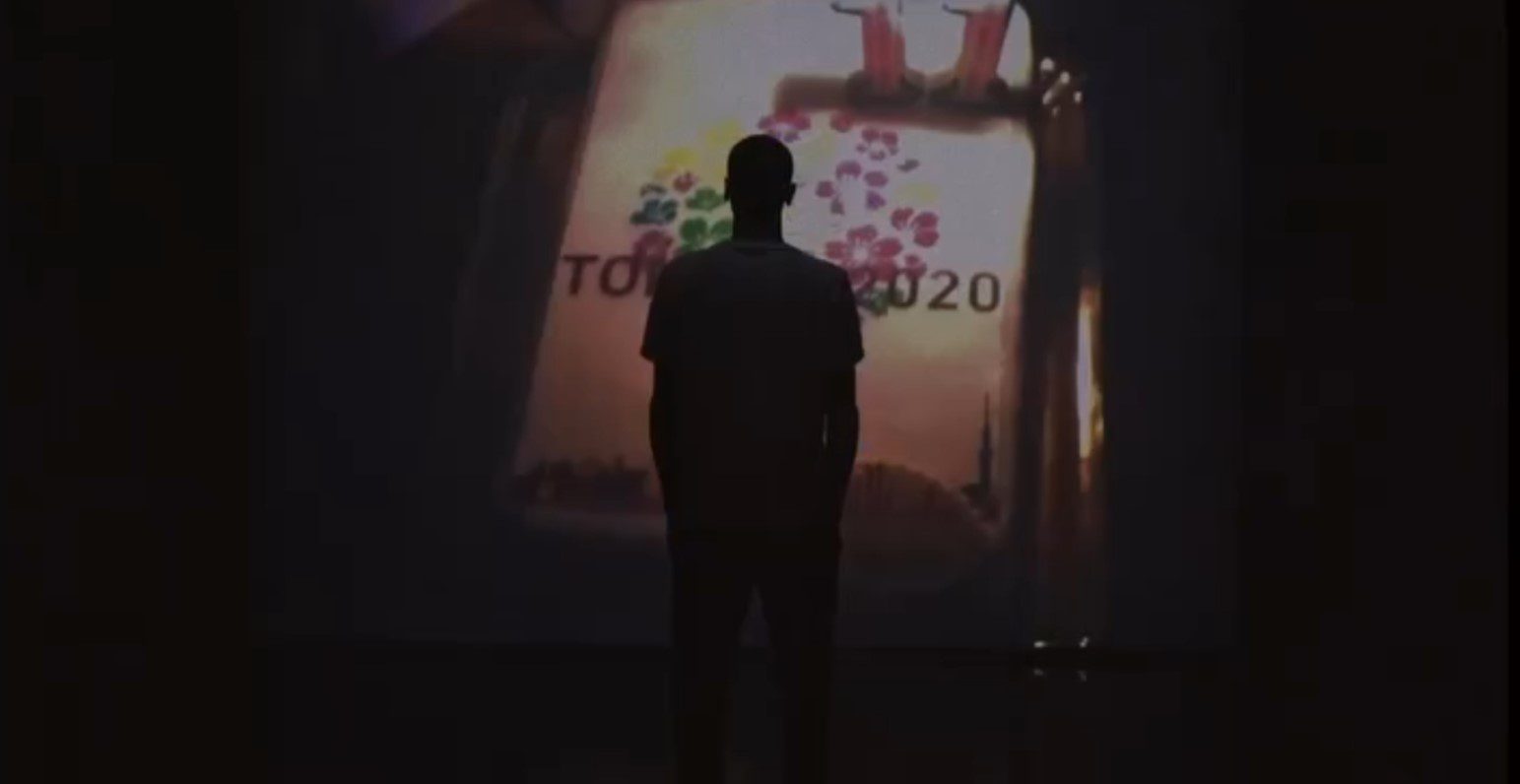
In the heart of Paris, amidst the roar of a passionate crowd, David Popovici made history by becoming the first Romanian male swimmer to clinch an Olympic gold medal. His impressive performance in the men’s 200m freestyle at the Paris La Defense Arena on July 29, 2024, not only marked a personal victory but also a significant milestone for Romania in the world of swimming. This blog post delves into Popovici’s remarkable journey, his philosophy of perfection, and the moments that made this event unforgettable.
A Night to Remember: The Moment of Glory
As the race came to an end, the atmosphere in the arena was electric. Popovici’s powerful strokes carved through the water, and as he touched the wall, adrenaline surged as he looked up to see his name at the top of the scoreboard. It was an ecstatic moment; with emotions spilling over, he splashed the water in celebration, embracing the victory he had worked so hard for. The gold medal hung around his neck like a testament to years of training and perseverance.
For a moment, the weight of expectations lifted, and he reveled in the joy of his achievement. Flashes from photographers captured the delight on his face as he posed proudly with his gold medal. However, this joyous interlude was fleeting. Known for his reflective demeanor, Popovici quickly transitioned back to his characteristic poise, preparing himself for what lay ahead.
Chasing Perfection: A Humble Mindset
What sets David Popovici apart is not just his record-breaking speed in the water but also his profound approach to the sport. In interviews, he remains modest despite his incredible accomplishments. “Absolutely no one is a perfect swimmer. Neither am I,” he reflects, acknowledging that even legends like Michael Phelps have their imperfections. This mindset drives him daily, as he trains relentlessly to get closer to his version of perfection.
“I just try to chase perfection,” Popovici emphasizes. “But being aware that you can never touch it.” This philosophy reveals a deeper understanding of the sport; it’s not just about the medals and records, but also about the relentless pursuit of improvement. It’s a lesson that resonates not just with athletes but with everyone striving for excellence in their fields.
The Road to Paris: Overcoming Challenges
David’s journey to gold was not devoid of obstacles. From early morning training sessions to grueling workouts, he faced multiple hurdles, including injuries and the pressure of competition. However, each challenge only fueled his determination to excel. Popovici’s focus remained unshaken, always looking ahead to the next race and the next goal.
His resilience mirrors that of many elite athletes who must navigate personal and professional challenges while maintaining peak performance. With each setback, he refined his technique and strategy, preparing for the brightest stage in the world: the Olympics.
Celebrating Romania’s Achievement
Popovici’s victory is more than just a personal triumph; it is a historic achievement for Romania, igniting national pride and inspiring a new generation of swimmers. His success brings attention to the country’s burgeoning talent in the sport and showcases the dedication of Romanian athletes on the global stage.
In the wake of his monumental win, Popovici has called for increased support for swimming programs in Romania, expressing hope that young swimmers will follow in his footsteps, fueled by dreams of Olympic glory. The impact of his achievement extends beyond the medal count—it inspires change and growth within the sport nationally.
David Popovici – A Legacy of Excellence
David Popovici’s journey to gold at the Paris 2024 Olympics embodies the spirit of chasing perfection, humility, and resilience. His victory not only adds a glorious chapter to his career but also sets a powerful example for athletes worldwide.
As he continues to push boundaries in the pool while remaining grounded, Popovici illustrates that greatness is not solely defined by victories but by the pursuit of improvement and the impact one can have on others. With his eyes set on future competitions, we can be sure of one thing: the “Skinny Legend” will keep chasing perfection, inspiring many along the way. The world eagerly awaits what will come next from this extraordinary athlete.
Health & Society
The intoxicated society
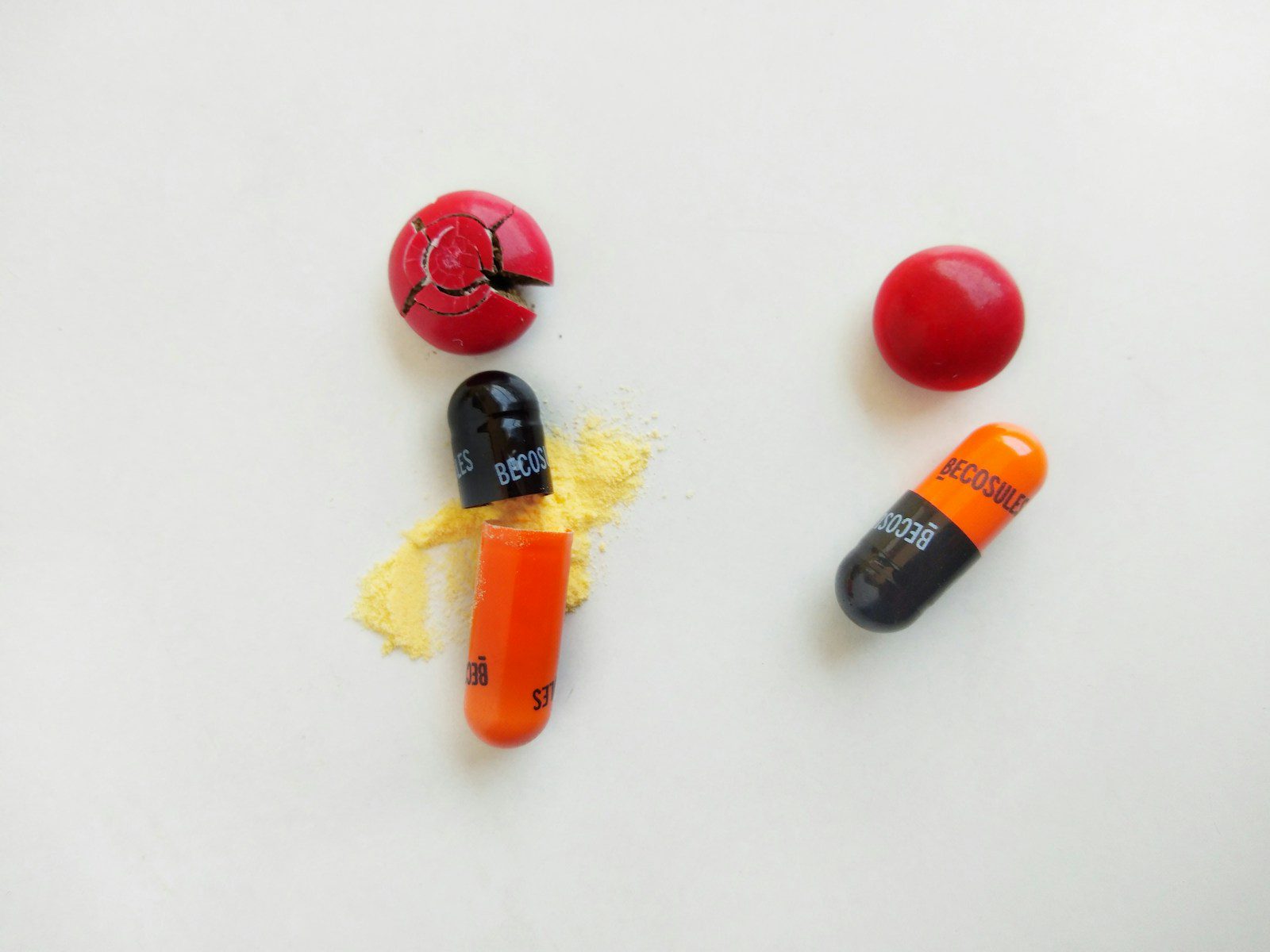
In modern societies, it has become fashionable to go to the family doctor and leave his office with a prescription for medicine. That makes us live the day with peace of mind. But what we do not know is that, with that small gesture of going to the pharmacy, giving the prescription to the person who attends us in that establishment and fully trusting the product they give us, without being interested, even one iota in knowing the indications of the medicine may be putting us in danger.
We are told by doctors or pharmacy clerks that reading the notebook, the leaflet, is not necessary. What’s more, if you are a consumer of a certain age, or if your eyesight is no longer what it used to be, or do not try, although perhaps with a magnifying glass you will achieve it. An old global marketing strategy, to discourage locals and strangers.
Do you think it is clear to the doctor or pharmacist that this medicine can cure them?
To get an answer I have gone to a book that fell into my hands a few days ago, published by Peninsula, in Spain: Chronicle of an intoxicated society. Its author Joan-Ramón Laporte. Born in Barcelona in 1948, he was 76 years old at the time, now dedicated to research, he was a professor of Therapeutics and Clinical Pharmacology at the University of Barcelona and head of the clinical pharmacology service at the Vall d’Hebron Hospital in Barcelona. In addition, throughout his career he founded the Catalan Institute of Pharmacology, a school for great professionals and promoted the creation of various scientific societies and research networks of national and international scope in Europe and Latin America, among many other things. Therefore, it seems to me an expert voice to be able to answer the previous question.
Without going into the book, which I must still confess that I have not “gutted”, “underlined” and studied as it deserves, I think that taking advantage of the generosity of its years of experience they will allow me to reproduce part of the first two paragraphs of the introduction to the same book, which by the way leaves many doors open for us to continue investigating.
“… In 2022, Spanish doctors wrote 1,100 million prescriptions for medicines. Out of 10 people, three take a drug for sleep or depression, two or three take omeprazole, and two take a cholesterol medication. Consumption is concentrated among the elderly and the poorest. Women receive twice as many psychotropic drugs as men. The poorest eight times more than the richest. Older people seven times more than younger adults.”
1,100 million prescriptions in 2022! Only in Spain.
According to the words of Joan-Ramón Laporte, it is clear that there are medications that, used at a specific time, will relieve pain, “cure” a disease and alleviate its symptoms…But they can also cause a new disease.
The series about doctors and hospitals, especially in the USA, permanently keep an eye on this question. How many times has an efficient, upright doctor whose commissions for prescribing according to which treatments should not be excessively high, discovered overmedication in a patient and tried to remedy it? How many times has the health system based on consumption allowed you to do it?
We are more profitable for the pharmaceutical industry as long as we take more drugs. Regardless of whether we are cured or not. What’s more, the home pharmacies hidden in the drawers of bedside tables or in cupboards full of pills, syrups, etc., are a current account where the State puts our tax money. The curious and unhealthy feeling that everything is free in the medical field is absurdly a lie. Someone pays and if the State does it, we do it.
Joan-Ramón Laporte, in his aforementioned book comments: In fact, we are suffering from a silent epidemic of adverse effects of medicines, which in Spain are the cause of more than half a million hospital admissions and at least 16,000 deaths a year, as well as dozens of cases of diseases as varied as severe bleeding, femur fractures, etc. pneumonia, cancer, violence and aggression, suicide, myocardial infarction and other heart diseases, stroke, dementia and Alzheimer’s disease,…
All of the above is written among the contraindications of many of the medications we take. And if we listen to the written words of the expert, who should we blame for the half a million hospital admissions due to the mismanagement (concern) that doctors make of the drugs they prescribe to us? And about the 16,000 deaths, deaths per year, who are responsible?
If we were talking about criminality in the field of police security and we were given a figure like this, data like these, with five hundred thousand injured and a scandalous number of deaths, we would be talking about the negligent attitude of our state security forces and bodies. Why not do the same with our doctors?
I sincerely believe that honest doctors should be the first to question the health system that surrounds us, and try to modify their attitude, comfortable, both personally and unionically, with the industrial network that exists behind the pill that the final consumer takes. The pharmaceutical industries are not charity angels as demonstrated every day in the hundreds of millions that pay for negligence around the world and by the profit and loss accounts they present at the same time, where they have earned billions at the expense of making consumers addicted.
Review the medications you take and don’t hesitate to talk to your doctor about their contraindications. And if you see that you take a lot of pills, seek a second opinion and lower your doses little by little, with the help of experts, in order to try to get out of a wheel that, as they tell you, leaves 16,000 deaths a year and half a million hospital admissions, according to the words of an expert such as Pharmacologist Joan-Ramón Laporte.
Health & Society
Foundation for a Drug-Free World Achieves United Nations Consultative Status
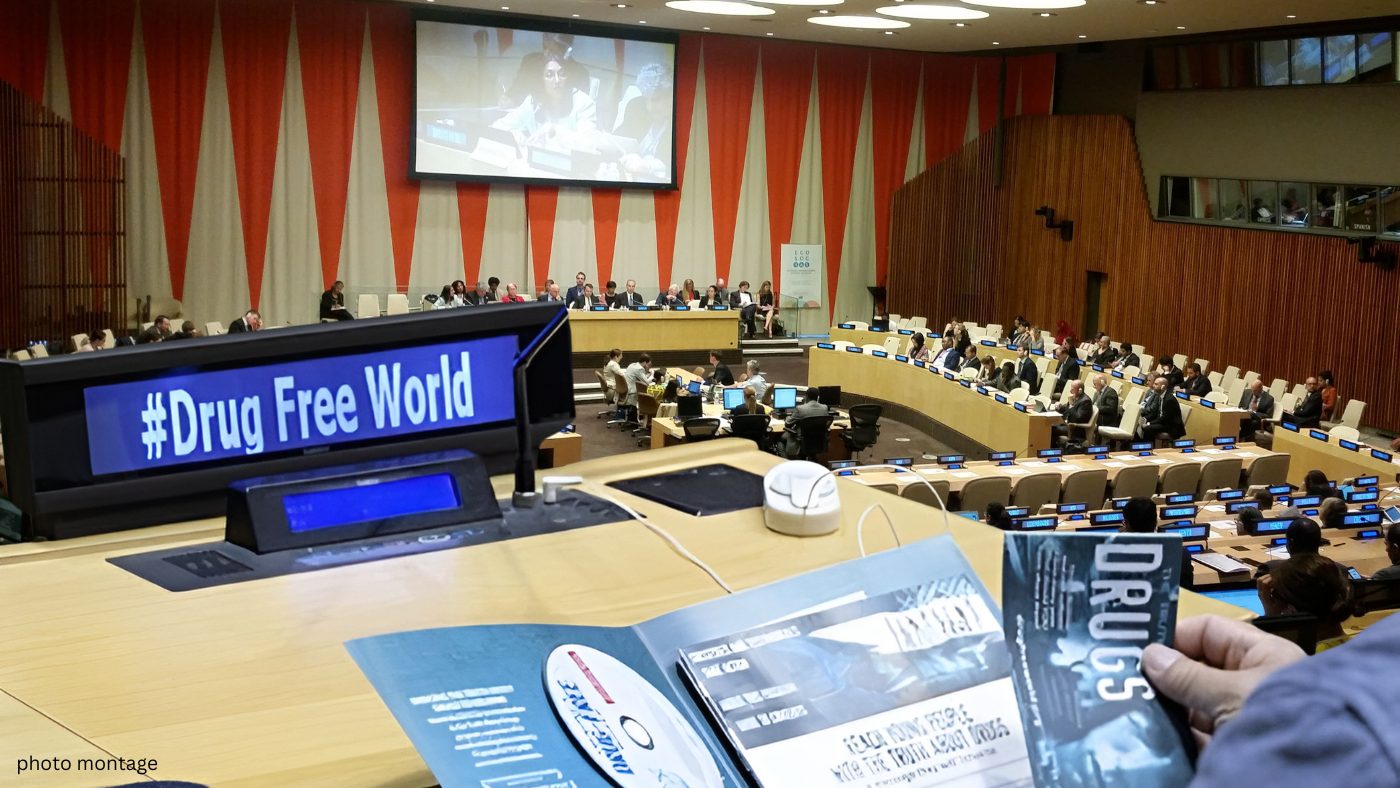
KingNewsWire // The year 2024 marked a memorable moment for the International Day Against Drugs as it celebrated a noteworthy achievement on June 25th. A day before the UN’s Day Against Drug Abuse, the Foundation for a Drug Free World was officially recognized by the UN Department of Economic and Social Affairs in granting the foundation with the NGO Special Consultative Status to the UN Economic and Social Council (ECOSOC) marking a new chapter in the battle against drug abuse.
“The importance of this milestone cannot be emphasized enough” said Ivan Arjona, President of the Foundation MEJORA and Scientology representative to the EU and United Nations. “With years of experience and expertise in drug prevention the Foundation for a Drug Free World is now ready to share its wealth of knowledge on drug education and prevention” he continued. This newfound status allows the foundation to actively engage in events and conferences at UN offices in Geneva, Vienna and New York, while empowering them to host conferences at UN premises focused on sharing their expertise gained through drug education and prevention efforts across various nations for decades.
Olivia McDuff, from the Church of Scientology International Public Affairs Office extended congratulations to the Foundation for a Drug Free World International recognizing the role played by volunteers, partners and supporters worldwide. McDuff highlighted the achievements while also acknowledging ongoing challenges, in addressing the global drug epidemic. She encouraged people who want to make a difference in this cause to check out the resources on the Foundation for a Drug Free World website or reach out for help at their local Church of Scientology, where people can find these materials for free.
It is at least since 30 years that members of the Scientology community have been actively involved in educating and preventing drug abuse in their neighborhoods. Their passion for this mission stems from the teachings of L. Ron Hubbard, humanitarian and the founder of Scientology, who understood the negative impact of drugs on society. Mr. Hubbard’s statement that “Research has demonstrated that the single most destructive element present in our current culture is drugs” strongly aligns with the goals of the Foundation for a Drug Free World.
Attaining this Special Consultative Status with the UN ECOSOC signifies a impinging advancement in combating drug abuse worldwide. “With their knowledge and experience the Foundation for a Drug Free World is well positioned to have an impact on global initiatives for drug prevention and education” stated Ivan Arjona-Pelado.
This acknowledgment not only confirms the foundation’s dedication to creating a world free from drugs but also emphasizes the importance of collaborative endeavors, in addressing the complex issues surrounding drug abuse globally. “Every effort to end with the drug epidemic, regardless of which religion supports it, is necessary and well received by those who want a Drug Free World, where children’s rights to live in drug free environments is actually produced” concluded Arjona-Pelado.
Health & Society
Victory in the Supreme Court: CCHR’s criticism of psychiatric abuse not without factual basis
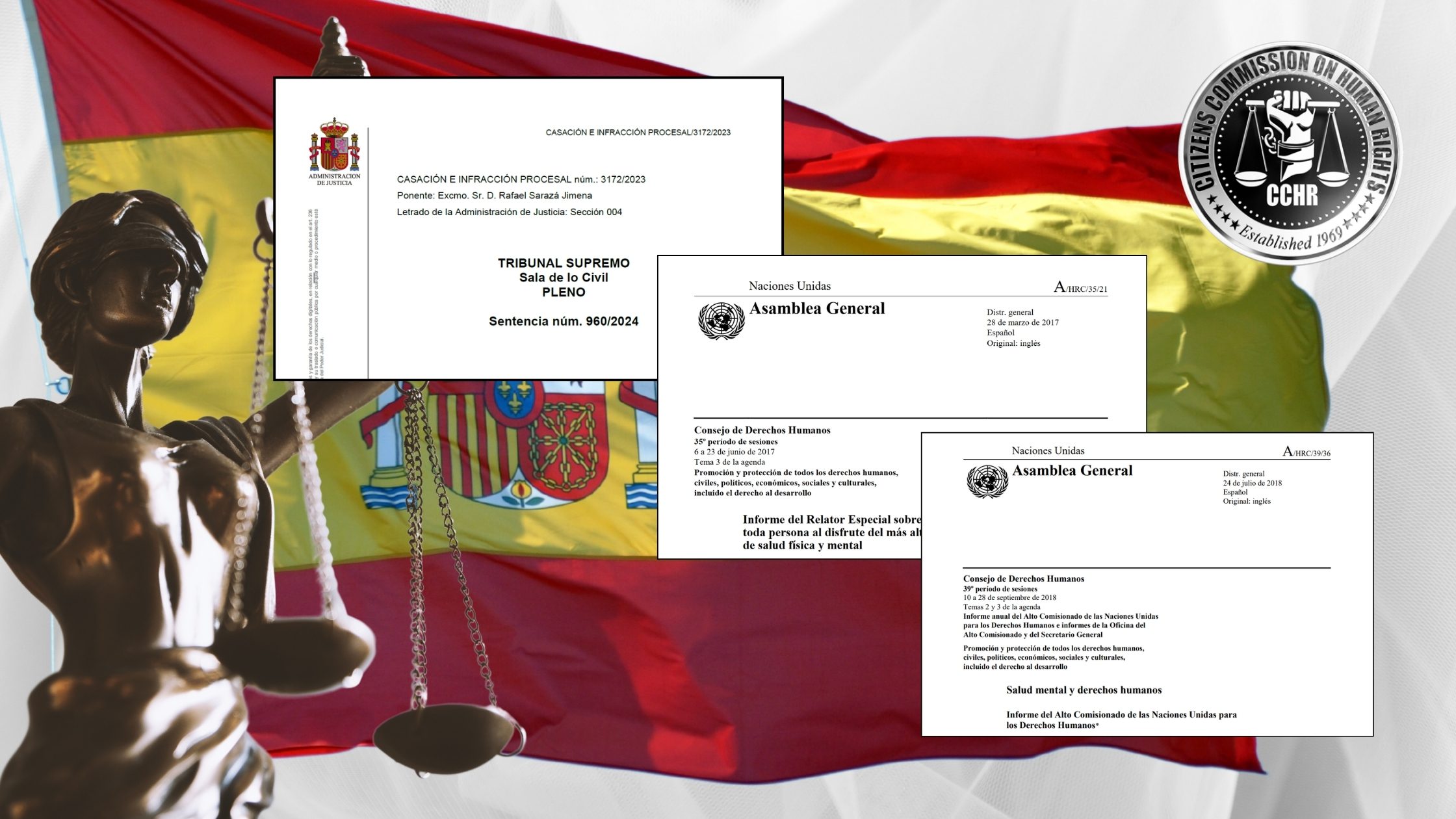
SALUDMENTAL ( Original in Spanish ) The Plenary Session of the Civil Division of the Supreme Court, in its ruling STS 960/2024 of July 9th and published on the 12th in response to the appeal after its defeat in the Provincial Court of the Spanish Society of Psychiatry (SEP), admits that the opinions and harsh criticism that the Citizens’ Commission on Human Rights (CCDH and CCHR) makes of psychiatric abuses such as those made with the use of psychotropic drugs, involuntary institutionalisation, electroshock, psychosurgery and others, “are not devoid of a sufficient factual basis”, and therefore decides to protect the right to express them, even in a harsh manner, as they are of “undoubted general interest”, as transcribed in this extract from the judgment:
“The publications in question deal with a matter of undoubted general interest: the debate on certain practices in the field of psychiatry. The extensive documentation submitted by the defendants clearly shows the existence of this debate. The reports of the UN rapporteurs submitted by the defendants (specifically, the 2017 ‘Report of the Special Rapporteur on the right of everyone to the enjoyment of the highest attainable standard of physical and mental health’ and the 2018 ‘Annual Report of the United Nations High Commissioner for Human Rights’ on ‘Mental Health and Human Rights’) are a good illustration of the important social, political and scientific debate on the issues covered by the questioned publications.
The debate on certain psychiatric practices and, in particular, on involuntary institutionalization, the use of psychotropic drugs, especially when the patients are children or adolescents, or surgical or electroconvulsive treatments, is of particular importance in today’s society.”
Furthermore, the high court affirms, “despite the crudeness of some of its expressions (…), its content is directly connected to the public debate in a democratic society (…) And is part of the conduct observed by CCDH of actively intervening in the social debate on psychiatry through its publications.”
On this basis, the Supreme Court has ruled that the Spanish Society of Psychiatry (SEP) must bear the criticism of the Citizens Commission on Human Rights. (CCHR) and Comisión Ciudadana de Derechos Humanos de España (CCDH).
Salvador Fernández, President of the Spanish Citizens’ Commission on Human Rights, after learning of the sentence declared that:
“it is important that there be protection so that the innumerable abuses that are committed in the field of psychiatry are made known, and the time has come to carry out the drastic reforms called for by the WHO, the UN, and above all the victims, of a century-old system that has brought more pain than glory, we thank all those who work in one way or another to expose and put an end to psychiatric abuse, and from our team we encourage society to not remain silent and to denounce through www.saludmentalyderechos.org any and all abuses in the field of psychiatry, whether it be the labelling and administration of dangerous psychotropic drugs to children, forced treatment, lack of informed consent, involuntary institutionalization or the use of electroshock, which has been described as torture on numerous occasions by doctors and human rights experts.”
CCHR was co-founded in 1969 by the Church of Scientology and Professor Emeritus of Psychiatry Dr. Thomas Szasz as an independent mental health watchdog at a time when patients were institutionalized, mistreated, stripped of their constitutional, civil and human rights, and left to fend for themselves.
As stated by CCHR co-founder Thomas Szasz:
“They were then the only organization, and they still are the only organization, who were active in trying to free mental patients who were incarcerated in mental hospitals with whom there was nothing wrong, who had committed no crimes, who wanted to get out of the hospital. And that to me was a very worthwhile cause; it’s still a very worthwhile cause. We should honor CCHR because it is really the organization that for the first time in human history has organized a politically, socially, internationally significant voice to combat psychiatry. This has never happened in human history before.”
CCHR and national and local affiliates around the world have long fought to restore basic inalienable human rights in the field of mental health, including, among others, full informed consent to the medical legitimacy of psychiatric diagnosis, the risks of psychiatric treatments, the right to all available medical alternatives, and the right to refuse any treatment deemed harmful.
In the judgement of the Provincial Court of Madrid 64/2024 of February 10th, appealed by SEP, the courts explained that CCHR and CCDH:
“aims to fight against abuse in psychiatry and especially against the prescription by these professionals of drugs for the treatment of mental illnesses and diseases and its work has been recognised by the Special Rapporteur of the UN Commission on Human Rights who in 1986 stated that it had helped to pass numerous laws in the field of mental health in defence and preservation of the rights of individuals according to the Universal Declaration of Human Rights, members of the Committee on the Rights of the Child at the United Nations and various members of the US House of Representatives and the California State Congress and Senate.”
In its text, the Supreme Court’s judgement includes, on the one hand, the video documentaries where CCHR shows its evidence and strong statements, opinions and concerns:
“On the other hand, the website www.cchr.org.es, whose content is owned and managed by CCHR (Citizens Commission on Human Rights), provides access to 8 documentaries that explain what they consider ‘psychiatric abuse’.”
And also, the “informative material” found on the website https://www.ccdh.es of the Comisión Ciudadana de Derechos Humanos de España (CCDH) where there are 19 leaflets with very strong titles, such as “Child Drugging. Psychiatry destroying lives. Report and recommendations on fraudulent psychiatric diagnosis and enforced drugging of youth”; “Deadly restraints. Psychiatric ‘therapeutic’ assault. Report and recommendations on the violent and dangerous use of restraints in mental health facilities”; “Brutal Therapies. Harmful Psychiatric ‘Treatments’. Report and recommendations on the destructive practices of electroshock and psychosurgery”; or “Psychiatric Malpractice, the subversion of medicine. Report and recommendations on psychiatry’s destructive impact on health care», among others.
The Spanish Society of Psychiatry complained about demonstrations in which CCDH and others claimed that “psychiatrists are criminals, precursors of genocides, responsible for the erosion of education and justice, inciters of drug addiction, drug traffickers, fraudulent practitioners or managers of violence and terrorism, that some psychiatrists sexually abused their patients and even that ‘[t]here are an undetermined number of coercive abortions in Spain by psychiatrists’, involvement of German psychiatrists in the Nazi holocaust [for which the German Psychiatric Association has publicly apologised], racial discrimination” and other descriptions and statements of fact.
The First Civil Chamber of the Supreme Court concluded that the judgment appealed by SEP had correctly applied the case-law criteria to resolve the conflict between freedom of expression and the right to honour.
And with regard to the context in which the statements in question were made, despite the fact that some of them could be considered serious, says the ruling, CCDH’s conduct in making these publications is part of a public debate of great importance in today’s society, so that agreeing to remove such publications would be an excessive restriction on freedom of expression that would not be justified by an imperative social need.
The SEP also complained about statements, such as that of psychiatrist Dr. Thomas Szasz when he says “Psychiatry is probably the most destructive force that has affected society in the last 60 years’, or ‘Psychiatry serves as a social control machine that sometimes becomes an agent of social and political revenge”, among other imputations.
The SEP argued that freedom of expression should not cover such statements, which the Supreme Court has contradicted, finding that the statements and criticisms of CCDH and CCHR are disseminated in a public debate on psychiatry.
The Supreme Court’s ruling reiterates the importance of freedom of expression in the context of debates of public interest, even when criticism may be offensive to certain entities or professionals, in line with what was said by the court of appeal. And it is here that the Supreme Court states that:
“This prevalence of freedom of expression over the right to honour when expressing opinions on matters of general interest occurs even when the expression of opinion is made in a rude, unkind or hurtful manner and may annoy, disturb or upset the person affected by the statements in question, as this is required by pluralism, tolerance and a spirit of openness, without which there is no democratic society.
As the judgments of the ECHR of 8 November 2016, Magyar Helsinki Bizottság v. Hungary, 13 March 2018, Stern Taulats and Roura Capellera v. Spain, 20 November 2018, Toranzo Gómez v. Spain, and 11 May 2021, Halet v. Luxembourg state, freedom of expression does not only protect ideas that are favourably received or considered inoffensive or indifferent, ‘but also those that offend, shock or disturb’. And Constitutional Court judgment 226/2016, of 22 December, citing previous judgments, states that ‘within the broad framework granted to freedom of expression are protected, according to our doctrine, “those manifestations which, although they affect the honour of others, are revealed as necessary for the presentation of ideas or opinions of public interest”’.
-

 Politics4 days ago
Politics4 days agoPoland’s Former Prime Minister Mateusz Morawiecki Eyes Leadership of European Conservatives and Reformists
-

 EU & the World4 days ago
EU & the World4 days agoAshanti & Nelly Welcome First Child Together & Reveal Baby Boy’s Name
-

 Sports4 days ago
Sports4 days agoAtalanta: PSG-Lookman, there is news
-

 Health & Society4 days ago
Health & Society4 days agoPope Francis calls on religions to unite to reduce demand for drugs
-
EU & the World4 days ago
Mike Lynch Yacht Update: Fifth Body Recovered Off Coast of Sicily
-

 Sports4 days ago
Sports4 days agoDucati, Pecco Bagnaia-Marc Marquez duel: “Valentino Rossi ready to step in”
-
Travel5 days ago
New Brussels to Venice night train: The 9 cities en route, what it will cost and how to book
-

 EU & the World4 days ago
EU & the World4 days agoDoes Travis Kelce Appear in Swift’s ‘I Can Do It With a Broken Heart’ Music Video?





